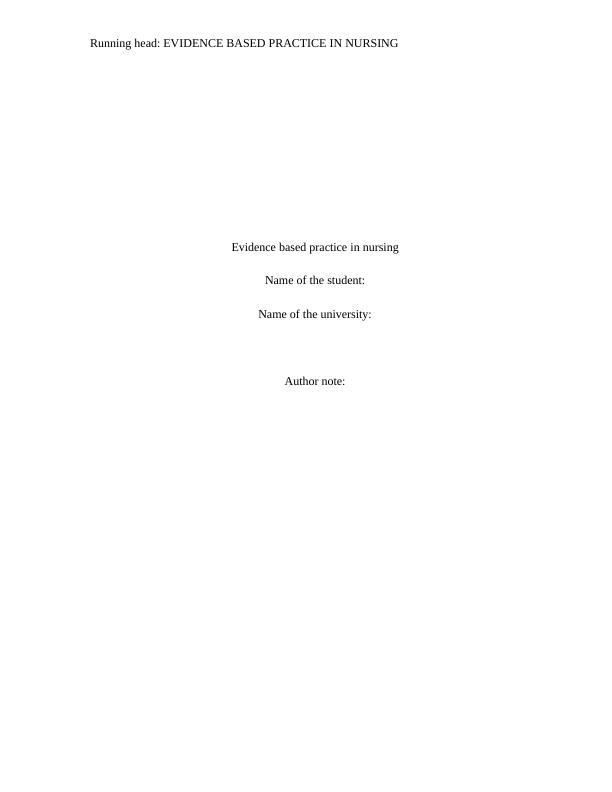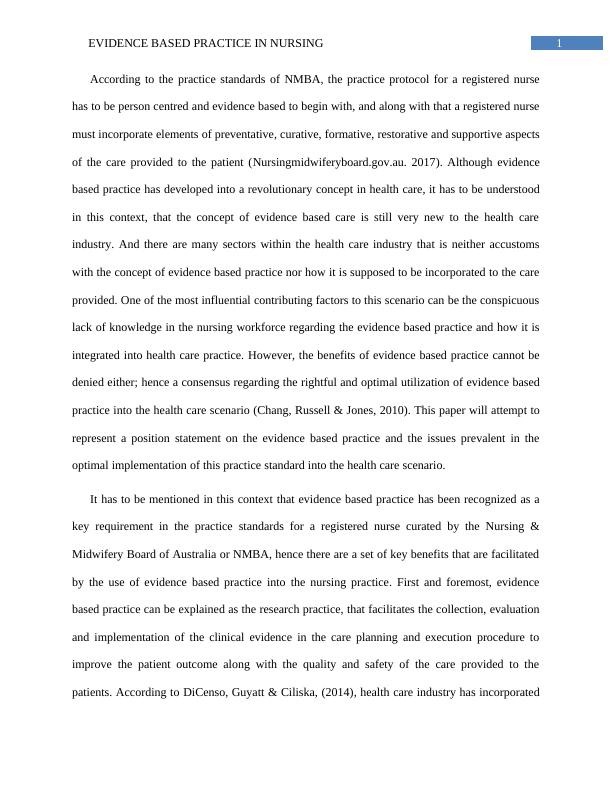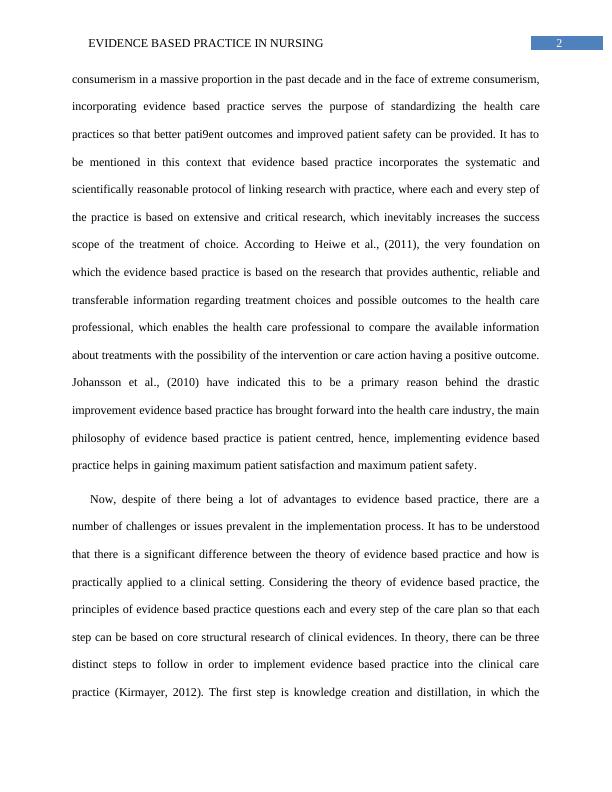NRSG367 Transition to Professional Nursing - Assignment
Added on 2020-05-04
7 Pages1917 Words68 Views
Running head: EVIDENCE BASED PRACTICE IN NURSINGEvidence based practice in nursingName of the student:Name of the university:Author note:

1EVIDENCE BASED PRACTICE IN NURSINGAccording to the practice standards of NMBA, the practice protocol for a registered nursehas to be person centred and evidence based to begin with, and along with that a registered nursemust incorporate elements of preventative, curative, formative, restorative and supportive aspectsof the care provided to the patient (Nursingmidwiferyboard.gov.au. 2017). Although evidencebased practice has developed into a revolutionary concept in health care, it has to be understoodin this context, that the concept of evidence based care is still very new to the health careindustry. And there are many sectors within the health care industry that is neither accustomswith the concept of evidence based practice nor how it is supposed to be incorporated to the careprovided. One of the most influential contributing factors to this scenario can be the conspicuouslack of knowledge in the nursing workforce regarding the evidence based practice and how it isintegrated into health care practice. However, the benefits of evidence based practice cannot bedenied either; hence a consensus regarding the rightful and optimal utilization of evidence basedpractice into the health care scenario (Chang, Russell & Jones, 2010). This paper will attempt torepresent a position statement on the evidence based practice and the issues prevalent in theoptimal implementation of this practice standard into the health care scenario.It has to be mentioned in this context that evidence based practice has been recognized as akey requirement in the practice standards for a registered nurse curated by the Nursing &Midwifery Board of Australia or NMBA, hence there are a set of key benefits that are facilitatedby the use of evidence based practice into the nursing practice. First and foremost, evidencebased practice can be explained as the research practice, that facilitates the collection, evaluationand implementation of the clinical evidence in the care planning and execution procedure toimprove the patient outcome along with the quality and safety of the care provided to thepatients. According to DiCenso, Guyatt & Ciliska, (2014), health care industry has incorporated

2EVIDENCE BASED PRACTICE IN NURSINGconsumerism in a massive proportion in the past decade and in the face of extreme consumerism,incorporating evidence based practice serves the purpose of standardizing the health carepractices so that better pati9ent outcomes and improved patient safety can be provided. It has tobe mentioned in this context that evidence based practice incorporates the systematic andscientifically reasonable protocol of linking research with practice, where each and every step ofthe practice is based on extensive and critical research, which inevitably increases the successscope of the treatment of choice. According to Heiwe et al., (2011), the very foundation onwhich the evidence based practice is based on the research that provides authentic, reliable andtransferable information regarding treatment choices and possible outcomes to the health careprofessional, which enables the health care professional to compare the available informationabout treatments with the possibility of the intervention or care action having a positive outcome.Johansson et al., (2010) have indicated this to be a primary reason behind the drasticimprovement evidence based practice has brought forward into the health care industry, the mainphilosophy of evidence based practice is patient centred, hence, implementing evidence basedpractice helps in gaining maximum patient satisfaction and maximum patient safety. Now, despite of there being a lot of advantages to evidence based practice, there are anumber of challenges or issues prevalent in the implementation process. It has to be understoodthat there is a significant difference between the theory of evidence based practice and how ispractically applied to a clinical setting. Considering the theory of evidence based practice, theprinciples of evidence based practice questions each and every step of the care plan so that eachstep can be based on core structural research of clinical evidences. In theory, there can be threedistinct steps to follow in order to implement evidence based practice into the clinical carepractice (Kirmayer, 2012). The first step is knowledge creation and distillation, in which the

End of preview
Want to access all the pages? Upload your documents or become a member.
Related Documents
Reflective Practice in Nursinglg...
|8
|2133
|345
Evidence Based Nursing Researchlg...
|10
|2694
|485
Overview Registered Nurses Case Study 2022lg...
|11
|3626
|25
Nursing Assignment | Manifestation of Evidence Based Practicelg...
|11
|2906
|71
Professional Identity in Nursing: Enhancing Patient Care through Nursing Code of Conductlg...
|8
|2291
|158
Position Statement Assignment PDFlg...
|10
|2543
|36
